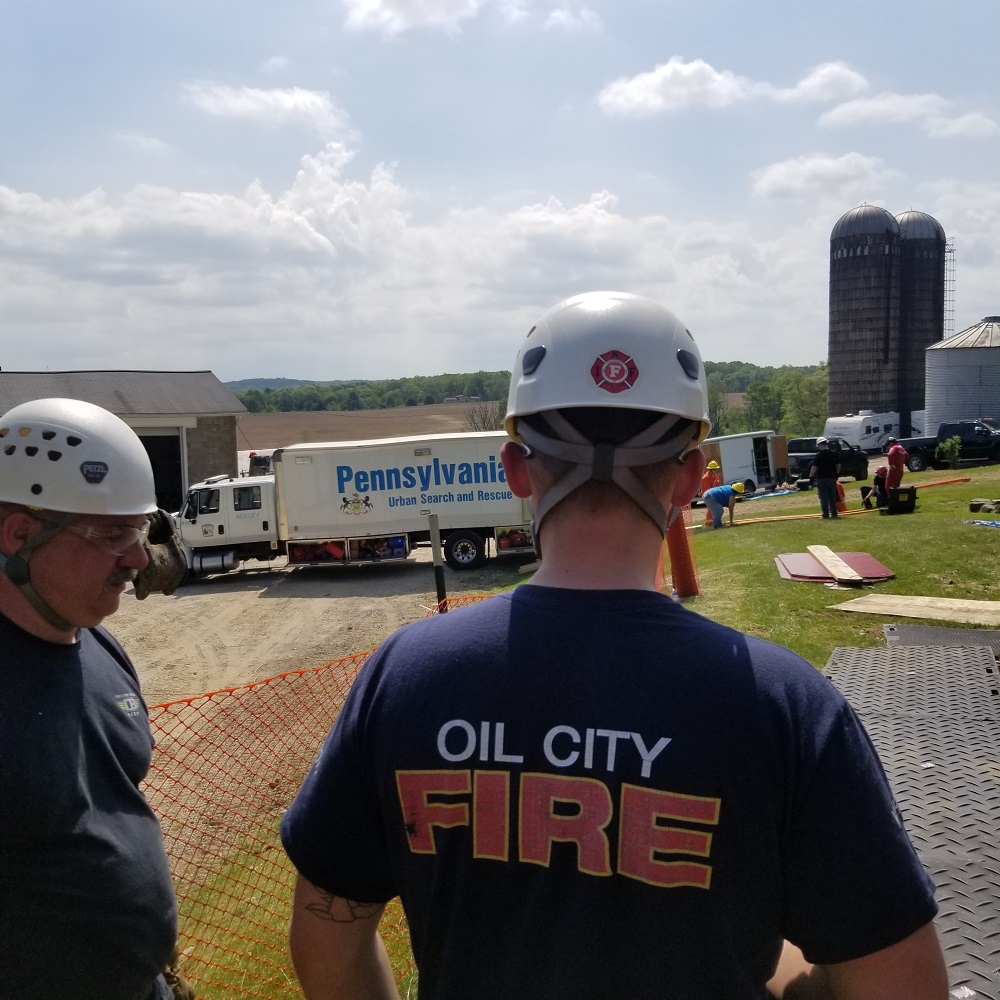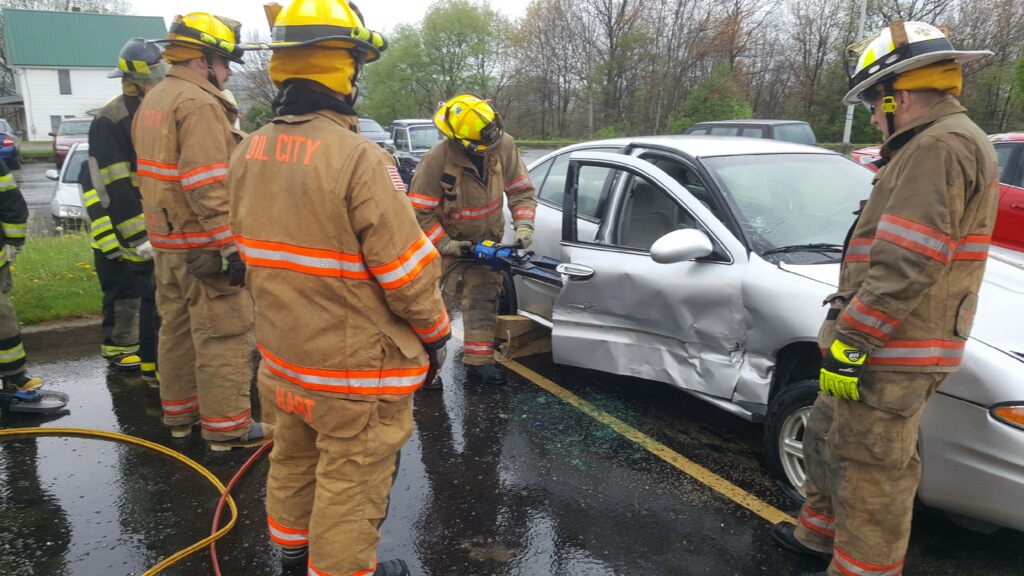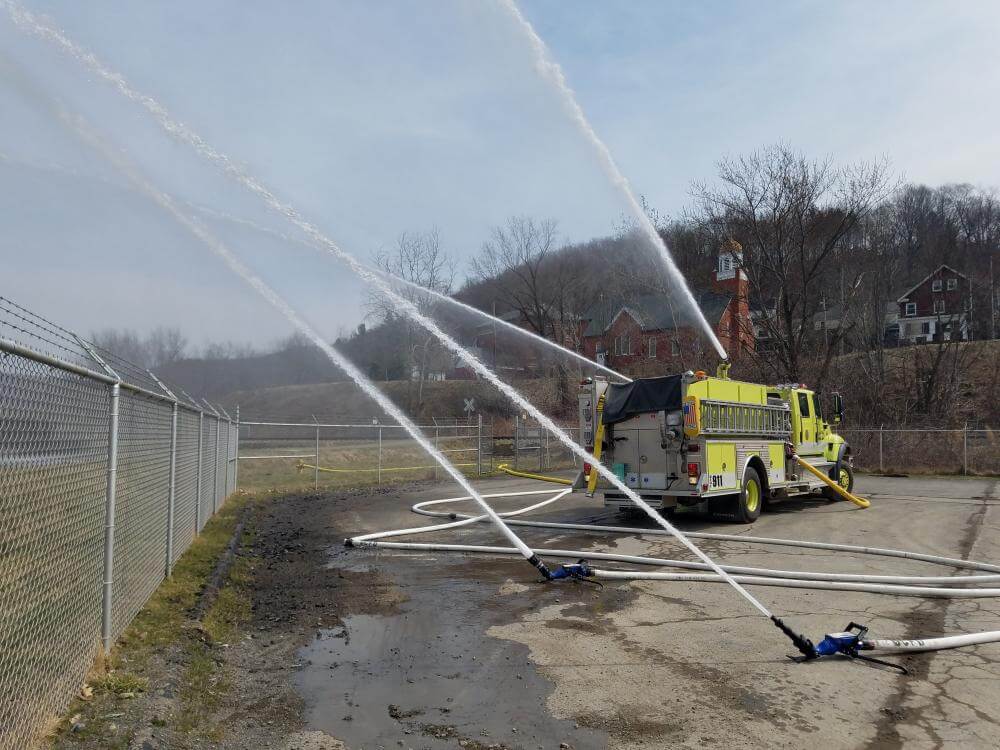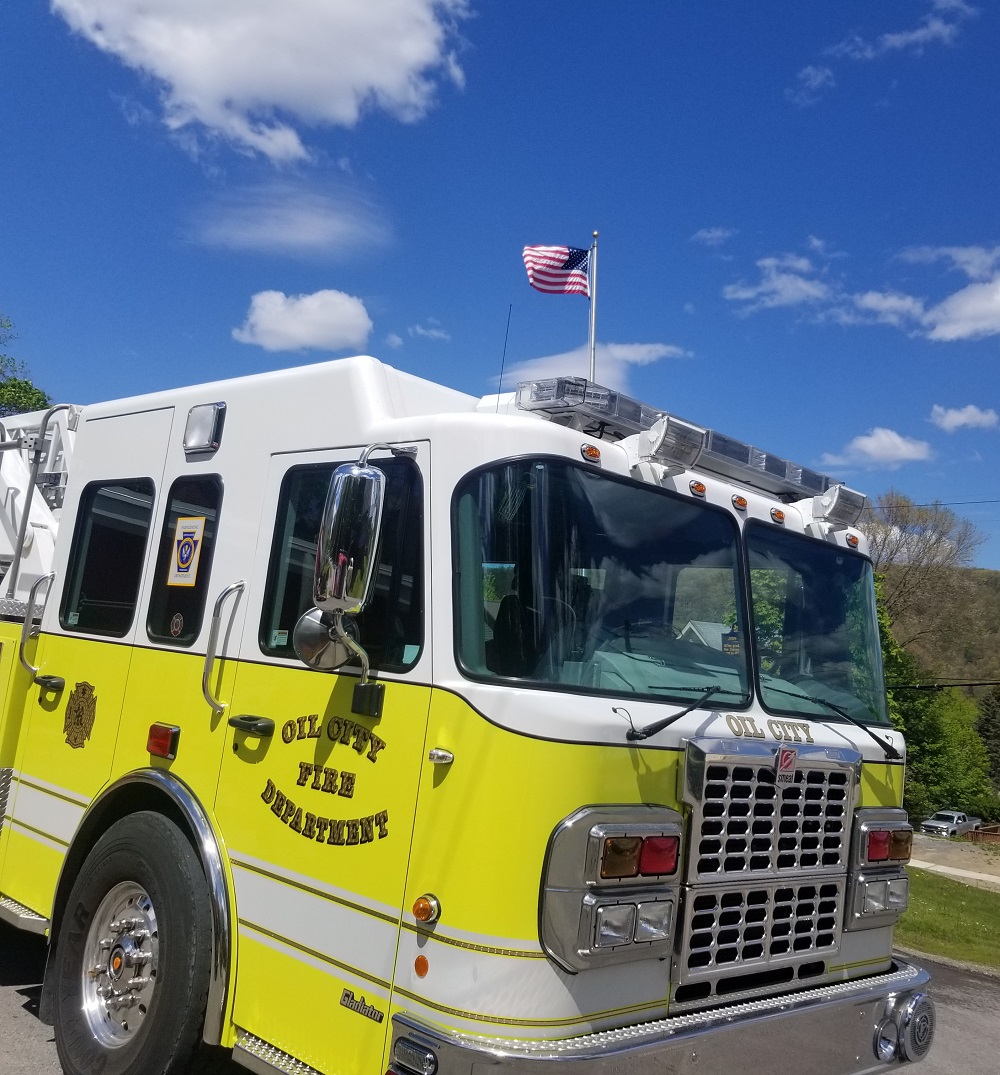The Oil City Fire Department, led by Fire Chief Tim Alex, has 2 stations located at 404 Central Avenue (Station 1) on the South Side and 332 Bissell Ave (Station 3) on the North Side. Each station is staffed with a minimum of 2 firefighters per station. Aside from emergency services, the Oil City Fire Department also provides services including traffic signal maintenance and ice device maintenance. The OCFD can be reached at (814) 678-3061. In case of emergency call 911 immediately.
Station 1 houses an engine, ladder truck, medical rescue, 2 boats, and a technical rescue unit, which is part of the Pennsylvania Urban Search and Rescue (USAR) team. Station 3 houses 2 engines and a light rescue. Personnel are on duty 24 hours a day, 7 days per week.
The full-time, career staff of the Oil City Fire Department belong to the International Association of Firefighters Local 700. All firefighters receive new recruit training upon hiring. Advanced training continues throughout the firefighter's career. All firefighters have achieved varying levels of National Fire Protection Association(NFPA) certifications including Firefighter 1, Firefighter 2, Fire Officer, Inspector, and Driver Operator certifications. All of our personnel are also certified to a minimum level of Emergency Medical Technician.


The Oil City Fire Department has two boats to respond to river and flooding emergencies. Both boats are housed at the Central Avenue station. The department also has several members that are certified SCUBA divers that respond to incidents in town, as well as with mutual aid companies.
The Oil City Fire Department operates two Advanced Life Support (ALS) certified Quick Response Service (QRS) vehicles. This is the only ALS QRS in Venango County and one of very few in the Commonwealth. Staffed with Paramedics and EMTs, the OCFD responds to any and all medical emergencies in the city, as well as provides paramedic backup to our neighbors. We work hand in hand with our local ambulance service to provide the highest level of medical care to the community. EMTs are certified in areas such as CPR, oxygen administration, assisting with medications, and trauma care. Paramedics are certified in EKG interpretation, IV and medication administration, and advanced airway procedures.
The Oil City Fire Department has members who are part of the Pennsylvania Urban Search and Rescue (USAR) team, PA Strike Team 1. These members are part of a statewide element that responds to varying disasters. These members receive specialized training in all aspects of technical rescue alongside firefighters from all around Western PA. USAR members have also trained with personnel from all around the US in places including New York City and Virginia Beach. The Oil City Fire Department's Rescue 4 is the special rescue/USAR unit that is fully equipped to respond to incidents including trench rescue, confined space rescue, rope rescue, high angle rescue, and structural collapse. OCFD also provides standby services to several of our local industries.


The Oil City Fire Department has certified fire inspectors which work closely with the Oil City Department of Code Administration to ensure that our businesses are safe for our community members. Inspectors conduct routine fire safety inspections of all city businesses on a regular basis. While most people think of fire prevention as one week in October, it is the majority of our job. The OCFD provides fire prevention training all year long, including safety talks to civic groups, fire extinguisher training, and fire prevention programs in our schools.
The Oil City Fire Department provides programs to the public on request in the areas of CPR, first aid, and stop the bleed. Several members of the fire department are also certified fire instructors for the PA State Fire Academy, training firefighters from throughout the commonwealth. For information on any of these programs, contact the OCFD online or at 814-678-3061.
The Oil City Fire Department permits and enforces open burning under the International Fire Code, Section 307. Fires other than recreational (cooking) fires require property owners to obtain a Fire Prevention Permit. This can be done by contacting the Fire Department online or at 814-678-3061. Once the Fire Department has been notified, your proposed burn site must be inspected and approved before open burning will be permitted.
Open burning that cannot meet the minimum requirement of 50 feet may be permitted in an approved container, i.e. a burn barrel. In this case, all other requirements must be met, however, the property owner must have 15 feet of clearance from any structure.
Fire Prevention Permits are not needed for recreational (cooking) fires. Small fires in a ring are required to be 25 feet from any structures, provided that the pile is less than 3 feet in diameter and less than 2 feet in height.
The fire department is authorized to order for the extinguishment of fire for reasons including fire code violations, permit violations, or hazardous conditions created by open burning.
In an emergency, seconds count. Help us help you by clearly displaying your house number on the front of your house. If we can't find you, we can't help you. Even residential buildings in town can vary greatly. We have everything from single-family homes, multi-family homes, to duplexes, up and down apartments, side by side apartments, half addresses, alley addresses, etc. In an emergency, we need to know exactly where we are going. Remember, you know where you live, but we don't. When we arrive, we are looking for the number on your house. Simple, 4-inch numbers on the front of your house saves the time that you may need. Not to mention that a large number of emergencies these days are called in via cell phone. In this event, an address does not automatically show up at the 911 center. This means someone who is not familiar with the town or a passerby may be the one calling in the emergency. Again, help can't get to you if we don't know where you are. People often think that when reporting a fire, it will be easy to find even without an address. While this may be true because a fire is usually quite obvious, we use the address as means to plan our travel route, truck placement, and, most importantly, our water supply, i.e. what hydrant to use. We literally have seconds to think about these things. Help us and your neighbors by clearly posting your address.
Unsettled weather patterns carry with them a unique set of warnings and watches. In Oil City, an emergency siren mounted on the roof of City Hall is used to alert local residents of an impending weather issue. The siren system is activated for specific hazards that could seriously affect city residents. Different types of emergencies prompt different siren tones.

Phone: (814) 678 - 3061
In case of emergency, call 911 immediately.
The Oil City Fire Department will provide and install smoke detectors free of charge to any Oil City resident on a first-come-first-serve basis. Interested residents should call the fire department at (814)678-3061.
Learn what to do and where to turn if a fire starts. As always, you can contact the Oil City Fire Department at 814-678-3061 for assistance.
PLAN YOUR ESCAPE!!! Follow this link to find resources to help you and your family design and institute an emergency escape plan.
Be ready when disaster strikes. Follow this link and learn how to prepare.
What do you guys do when you're waiting for a call?
Our day starts at 7:30 a.m. and we work a 24 hour shift. Our day starts with a report from the off-going crew. This includes topics such as equipment problems, street closures, up-coming events, etc. The report is followed immediately by "truck checks and housework." This means that every apparatus at both stations gets a thorough operational check, including every self-contained breathing apparatus, fire pumps, portable equipment, and medical equipment. This gets done every day, 365 days a year. On Saturdays, there are additional checks that are completed including running all generators at the stations as well as a thorough operational check of the aerial device. Once the apparatus and equipment are checked, our daily cleaning is done. As we say, it is called a "firehouse" because we live there during our shift, and we are responsible for a clean and sanitary place for us and the public that comes in. This includes sweeping and mopping, cleaning bathrooms, kitchens, bunk rooms, apparatus bays, etc. On certain days of the week, there is also "extra" cleaning, which means buffing floors, disinfecting the Rescue Truck and medical equipment, mowing the lawn, etc. Given emergency calls, phone calls, and other unplanned events, these things may take up the whole morning. Once all this is done, it's usually time for paperwork. And more paperwork. We are required to submit several different types of reports, depending on the type of call. We use a system called "Emergency Reporting System." This is a computer based reporting system that we are required to complete and submit to the Commonwealth for every incident that we respond to, whether it be a fire, EMS call, public service, etc. These are done throughout the shift and depending on the type of call, this can take anywhere from 5-45 minutes for each report. We will immediately start "catching up" reports from any calls during the night. Again, we work 24 hours, so there's a lot of calls you may not even see us going to during the night. Being a licensed EMS agency, we are also required to complete and submit a "trip sheet" to the Commonwealth. This is a system called "EMS Charts," which is also an online reporting system. We are required to do this for EVERY EMS call to which we respond. Given the type of call, this can take anywhere from 5 to 30 minutes for each report. So, as you can see, paperwork is a permanent fixture in our line of work. If and once you get this caught up, there are always non-emergency functions occurring. We have several certified Fire Inspectors on each shift, which means our members work hand in hand with the City's Code Department to perform building inspections of every public building in the city to ensure the safety of anyone that works in or comes to our city to do business. If you look at the amount of public buildings in the city, you can do the math to see how much time that could take. Our members are also responsible for taking care of traffic signals in the city. This could be as simple as changing a light bulb, to running wiring under the street to traffic controllers. Then there is training. Being a licensed EMS agency, all of our members are required to complete Continuing Education hours to maintain their EMT or Paramedic certification. This is not optional. Some of this can be done on duty and some of it requires members to attend classes on their days off, sometimes after working a 24 hour shift. The members are also assigned Monthly Drills to complete every month in addition to the Con-Ed they have to complete. These drills include hose line drills, pump practice, rescue drills, driver training, rapid intervention team training, technical rescue training, etc. Each member is also required to attend Hazardous Material Refresher training every year. This department also provides Confined Space Rescue for several local industries. This requires annual walk throughs, and refresher training at these facilities. Our department, in addition to the Water Department, is responsible for conducting hydrant maintenance. This means that every year, we conduct cleaning, lubrication, and flushing of the hundreds of fire hydrants in the city. This is a process that takes months to complete. Again, that is every hydrant in the city. Then there are Fire Prevention Programs. Everyone knows that Fire Prevention Week is in October. But, we do Fire Prevention Programs all year long, not just in October. We concentrate on our schools and daycares in the fall and spring. This means doing presentations and station tours for hundreds and hundreds of students. But we also do programs for different groups all year including the Cub Scouts, Boy Scouts, Girl Scouts, etc. We also provide fire extinguisher training programs for local businesses, nursing homes, Venango Technology Center, and others. You may have also driven by the Central Avenue Station and seen hundreds of feet of hose laid out in the parking lot. Every year, we are required by ISO to pressure test every section of hose in the entire fire department. Just to give you an idea, each engine has over 2500 feet of fire hose and we have an entire room in our building with racks of extra hose. This means that every piece of hose is pulled off the trucks, filled with water, pressure tested, washed, dried, rolled, and replaced on the truck. This is another process that takes weeks and weeks to complete. Another thing ISO requires is that the fire pumps on the trucks be tested. That means that every apparatus has to flow water and be tested to assure the rated capacity is met. And, of course, all this requires record keeping. This just touches on the things we do when we are not "running calls." As you can see, we did not even mention responding to emergency calls. While we are one of the busiest departments in Western Pennsylvania, emergency calls still only account for a limited part of our job.
Get connected by Swift911, the #1 way to receive notices and information about community emergencies. Sign up today!
Connect Connect
Connect